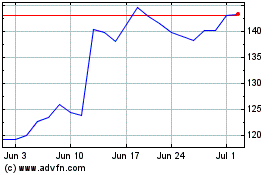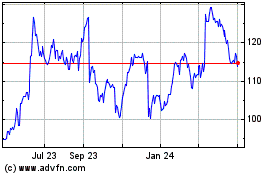By John D. McKinnon
This article is being republished as part of our daily
reproduction of WSJ.com articles that also appeared in the U.S.
print edition of The Wall Street Journal (July 8, 2019).
WASHINGTON -- The Pentagon plans to award a long-awaited
cloud-computing contract next month, but the huge program --
expected to cost up to $10 billion -- faces mounting complications
from congressional scrutiny and a court challenge.
Amazon.com Inc. and Microsoft Corp. were designated in April as
finalists for the contract, drawing complaints from rival companies
including Oracle Corp. and International Business Machines Corp.,
which say the contract-award process was skewed from the start to
favor Amazon -- an allegation both the Pentagon and Amazon
dispute.
Defense Department emails reviewed by The Wall Street Journal
could give the contract's opponents more ammunition, providing a
new window into Amazon's interactions with Pentagon officials in
the months leading up to the announcement of the massive cloud
deal, known as Joint Enterprise Defense Infrastructure, or
JEDI.
The emails show that on March 31, 2017, then-Defense Secretary
Jim Mattis attended a dinner in London with Teresa Carlson, vice
president of Amazon's business selling cloud services to
governments, though an organizer of the dinner said cloud computing
never came up. That dinner helped lay the groundwork for a meeting
in August of that year between Mr. Mattis and Amazon founder Jeff
Bezos, the emails show.
Pentagon officials with ties to Seattle-based Amazon also helped
arrange meetings for Ms. Carlson with Mr. Mattis's chief of staff
and other Pentagon officials around the same time, according to the
emails, which were released under the Freedom of Information Act.
The emails didn't lay out what was discussed.
An Amazon spokesman said its cloud subsidiary, Amazon Web
Services, has "received no preferential treatment in any
procurement as a result of any meetings, one-on-one or otherwise,
with DoD officials."
Pentagon spokeswoman Elissa Smith also defended the bidding
process, calling it "open, transparent and full," and said no one
in the secretary's front office participated in drafting the
solicitation for bids.
Oracle has challenged the procurement process in the U.S. Court
of Federal Claims, charging that a former Amazon employee working
at the Pentagon helped shape the deal to favor Amazon, and then
returned to work for Amazon. Oracle's suit is scheduled for a court
hearing this week. The Pentagon says that employee didn't affect
the bidding process.
Oracle says the pre-bid meetings between Pentagon officials and
Amazon executives support its contention that the Pentagon had
Amazon in mind when it drafted proposals for the project.
"It is highly irregular that the Secretary of Defense attended a
small, private dinner for 'off-the-record' discussions with an
Amazon sales executive," said Kenneth Glueck, who runs Oracle's
Washington office.
Sen. Chuck Grassley (R., Iowa), said the emails bolster his
belief that the Pentagon should restart the bidding process.
"We shouldn't have to tolerate conflicts or appearances of
conflicts of interest in any government contracting process," Mr.
Grassley said in a statement.
Winning the JEDI contract would cement Amazon's status as a
major player in Washington. It already has built a large
federal-government cloud business and has lobbied on issues ranging
from internet and privacy policy to the U.S. Postal Service and
government supply contracting.
The Pentagon said it plans to award the contract by the end of
August. But the defense appropriations bill passed by the House on
June 19 stipulates that no funds be spent to move data to the JEDI
cloud until the Defense Department explains how it plans to later
transition to multiple cloud providers, the government's stated
preference.
The emails reviewed by the Journal show that during the London
meeting, Mr. Mattis said he would be interested in meeting with
Amazon's chief executive, Mr. Bezos. About five months later, Mr.
Mattis met with Mr. Bezos as part of a broader West Coast swing
that included visits to Alphabet Inc. unit Google and a Pentagon
innovation unit in Silicon Valley.
Mr. Mattis didn't respond to requests for comment through
Stanford University's Hoover Institution, where he is a fellow.
A few weeks after the meeting with Mr. Bezos, Mr. Mattis's
then-deputy, Patrick Shanahan, said the Pentagon would take
"aggressive steps" to move more rapidly to cloud computing,
according to a memo date-stamped Sept. 13, 2017.
The Pentagon put out a draft request for proposals on the cloud
project in March 2018, followed by a formal request in July.
Mr. Mattis's scheduling calendar from early 2017 also shows he
met with at least two other business leaders whose then-companies
are in the cloud-computing business: Bill Gates, the retired
founder of Microsoft, and Eric Schmidt, the former Google CEO and
chairman who in recent years has headed a Defense Department
modernization task force. Google and Microsoft both declined to
comment.
Oracle has had high-level contacts of its own over the JEDI
deal. Oracle co-CEO Safra Catz, a public supporter of President
Trump and a member of his transition team, attended a White House
dinner with the president last year where another guest complained
about how the JEDI deal had been skewed to favor Amazon. Ms. Catz,
who hadn't planned to bring up the issue, expressed agreement,
according to a person familiar with the matter.
The White House said Mr. Trump has played no role in the
procurement, and Oracle's Mr. Glueck said Ms. Catz's contact with
Mr. Trump came after the Pentagon had already decided on its cloud
approach. He said that single contact pales in significance
compared with Amazon sales representatives' multiple meetings with
key defense officials, including Mr. Mattis, while the Pentagon's
new approach to cloud computing was being weighed.
The London dinner was held at 5 Hertford Street, a private
sanctuary for A-listers in politics, business and entertainment,
according to a document reviewed by the Journal. The attendees
included Sally Donnelly, an aide to Mr. Mattis who had previously
been a Washington consultant for Amazon.
Ms. Donnelly "always adhered to all ethical and legal
obligations" during her Pentagon service, her lawyer, Michael Levy,
said in a statement. He said she played no role and exerted no
influence in connection with the JEDI contract.
The Pentagon emails show that Ms. Donnelly was involved in
arranging meetings between Amazon and Pentagon officials, including
the one between Messrs. Mattis and Bezos.
Scheduling such meetings wouldn't have violated any ethics
rules, said Ms. Smith, the Pentagon spokeswoman. Ms. Donnelly and
Anthony DeMartino, another former Amazon consultant who also served
in the secretary's office, fulfilled all ethics requirements, she
added. Mr. DeMartino didn't respond to requests for comment.
The London dinner was partly organized by Graeme Lamb, a retired
lieutenant general with U.K. special forces who is now a partner in
C5 Capital, a London-based venture-capital firm that has partnered
with Amazon on tech incubators in the Middle East and
Washington.
Mr. Mattis requested the dinner, Gen. Lamb said. He said the
meeting focused on the needs of military veterans and that cloud
computing didn't come up.
In one follow-on email to another defense official after the
London dinner, however, an aide to Mr. Mattis sought to facilitate
an April meeting between the secretary and Mr. Bezos. The aide
wrote that "the SD [Secretary of Defense] and Ms. Donnelly had
dinner with Teresa Carlson during the London trip; at the dinner,
the SD expressed interest in meeting with Bezos at some point."
The aide added: "Purpose of the discussion would be for Bezos to
impart his thoughts/observations on DoD's relationship with the
tech sector."
The awarding of the JEDI contract was already delayed once while
the Pentagon investigated the role of Deap Ubhi, who worked at
Amazon both before and after a 2016-2017 stint with the federal
government. It was Mr. Ubhi who Oracle says helped steer the JEDI
procurement process to favor Amazon, a charge the company and the
Pentagon dispute. Mr. Ubhi didn't responded to requests from
comment.
Although the Pentagon concluded the bidding process hadn't been
adversely affected, it referred the matter to its own inspector
general for further investigation. The inspector general declined
to comment.
--James V. Grimaldi contributed to this article.
Write to John D. McKinnon at john.mckinnon@wsj.com
(END) Dow Jones Newswires
July 08, 2019 02:47 ET (06:47 GMT)
Copyright (c) 2019 Dow Jones & Company, Inc.
Oracle (NYSE:ORCL)
Historical Stock Chart
From Mar 2024 to Apr 2024

Oracle (NYSE:ORCL)
Historical Stock Chart
From Apr 2023 to Apr 2024
